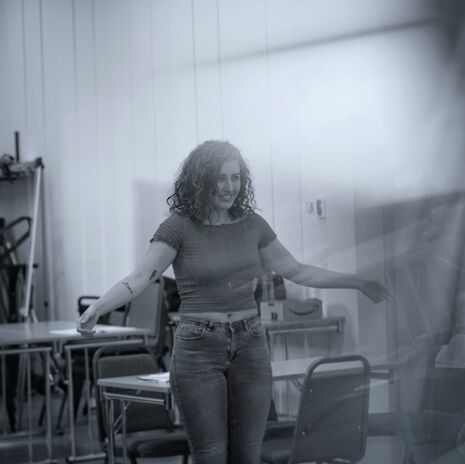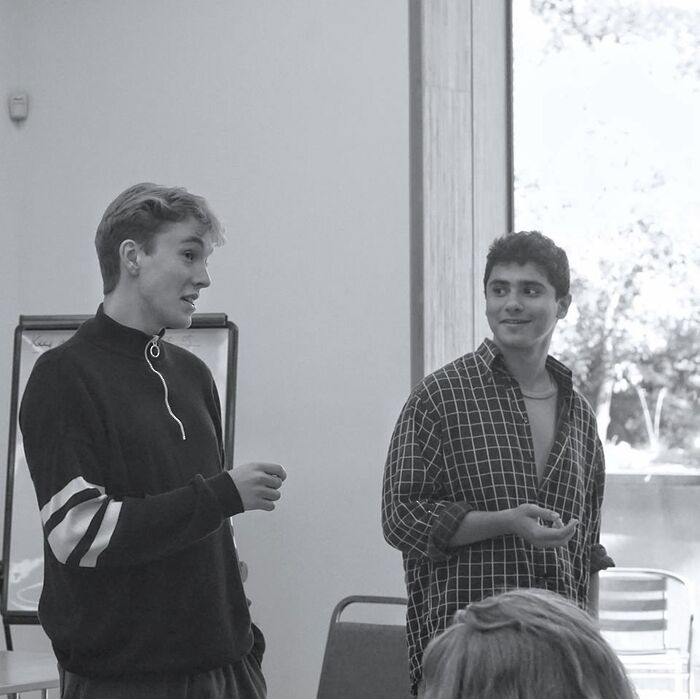The Glass Menagerie review
Although it has moments of brilliant subtlety, this production seems out of touch with the words of its revered playwright

The opening scene thrills with beauty and tension, and the spell of the past. Tom (Bilial Hasna) wanders across the stage, wonderfully drawing out the poetry of Tennessee Williams, the lightbulbs hanging from the ceiling behind him catching the light as they sway, the screen behind him covering the set like a layer of dust left there by time. His smile as he looks back at life perfectly captures the nostalgic, the sense of the pain and beauty of the past, that is so crucial to this play.
It feels as if the rhythms of Williams’ language... are slightly missed by the actors in their performance
The set has been considered in every tiny detail, from the symbolic blue roses on the wallpaper to the gramophone to the ladder on the right hand side of the stage which acts as the fire escape; this smaller space on one side of the stage forms a space of intimacy which is the site of some of the play’s most profound conversations. The dining room table is sectioned off, surrounded by curtains – I was not entirely convinced by the motivation for this aesthetic decision, but it was an interesting addition to the set.
This show certainly has its moments of brilliance. Kim Alexander, playing Tom’s mother, is hilarious, particularly in the phone conversations with her subscribers: her comic timing is exquisite. Alexander manages to capture the exasperated hysteria of a mother worried about her son going off the rails, about not having enough money to get by – and about her daughter who never has any gentlemen callers. Her accent is great, but she must make sure that none of her words are lost in the pace and excitement of her speech.
the audience cannot help but lean in, intent on their every word, pressing closer to see the glass animals as the light shines through them.
The main shortcoming of this play, however, is this: there seems to be a disjoint between the words and the actors. It feels as if the rhythms of Williams’ language, which are so crucially to its beauty, are slightly missed by the actors in their performance, and at times it feels as if they don’t quite understand what they are acting. The second half is much less guilty of this, as Ellie Gaunt and Leo Benedict, in their long candle-lit scene, pitch their words perfectly with the subtlety and yet heart-wrenching emotion that the scene demands. As they sit on cushions on the floor behind the candelabra, talking about the past and the present and their characters, the audience cannot help but lean in, intent on their every word, pressing closer to see the glass animals as the light shines through them.
This final scene is still not perfect, however, and I felt that there was something missing. Perhaps it was the blocking, which left the characters in the same place for most of the scene – there was just not enough dynamism. Their dance, however, is magical, and perhaps this giggling intimacy is what redeems the scene.
It is in this final scene that the music finally seems to make sense. Throughout, it seemed like the music was a bit gratuitous, motivated only by Tom’s initial comment about how memory is always to music, but with no particular direction. It was not quite matched to the words, making sentimental or frivolous some powerful scenes which should be listened to with the weight of silence behind them.
All in all, this was an enjoyable performance to watch. It could have been blocked a bit more dynamically, and maybe the lighting could have been more daring, but the main problem, in my eyes, came in the moments when the actors didn’t seem to care or really understand what they were talking about. There were moments of true beauty, however, where the words of Williams were expressed with subtle emotion, expressing a sense of the uncertain future and the need to make sense of everything – but this were moments which fell short, and this is a great shame.
 News / SU reluctantly registers controversial women’s soc18 December 2025
News / SU reluctantly registers controversial women’s soc18 December 2025 News / CUP announces funding scheme for under-represented academics19 December 2025
News / CUP announces funding scheme for under-represented academics19 December 2025 Features / Should I stay or should I go? Cambridge students and alumni reflect on how their memories stay with them15 December 2025
Features / Should I stay or should I go? Cambridge students and alumni reflect on how their memories stay with them15 December 2025 Fashion / The art of the formal outfit 18 December 2025
Fashion / The art of the formal outfit 18 December 2025 News / Dons warn PM about Vet School closure16 December 2025
News / Dons warn PM about Vet School closure16 December 2025










